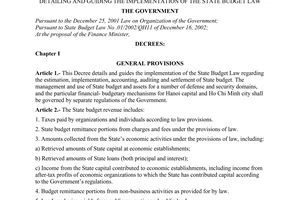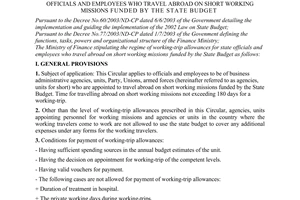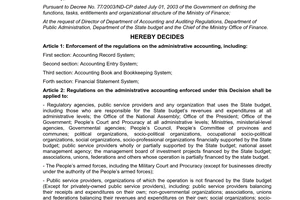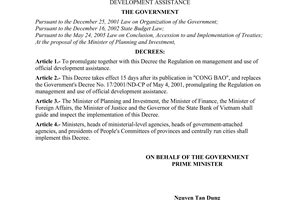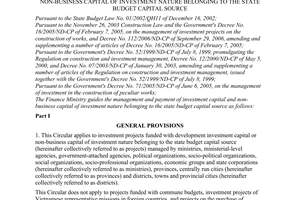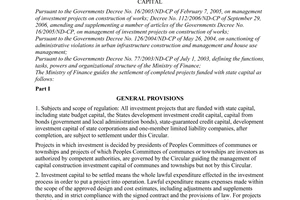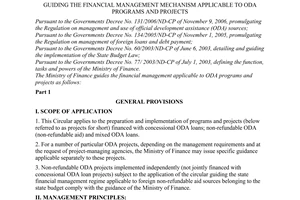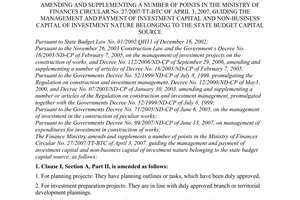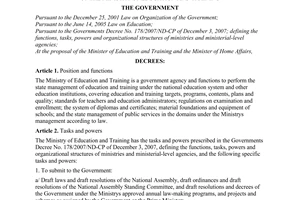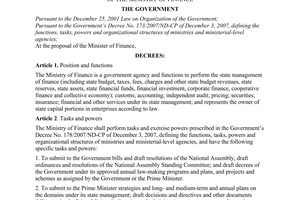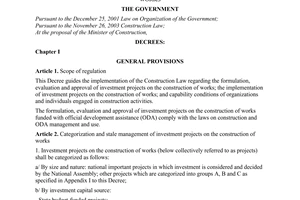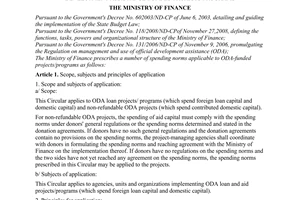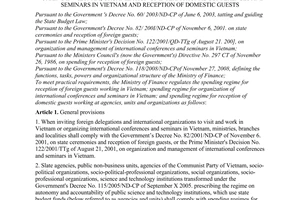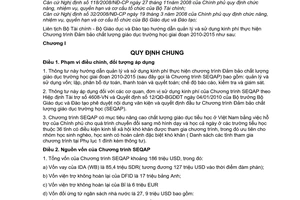Nội dung toàn văn Joint Circular No. 15/2010/TTLT-BTC-BGDDT, guiding the management and use of funding for implementation
|
THE
MINISTRY OF FINANCE - THE MINISTRY OF EDUCATION AND TRAINING |
SOCIALIST
REPUBLIC OF VIET NAM |
|
No. 15/2010/TTLT-BTC-BGDDT |
Hanoi, January 29, 2010 |
JOINT CIRCULAR
GUIDING THE MANAGEMENT AND USE OF FUNDING FOR IMPLEMENTATION OF THE SCHOOL EDUCATION QUALITY ASSURANCE PROGRAM FOR THE 2010-2015 PERIOD
THE MINISTRY OF FINANCE - THE MINISTRY OF EDUCATION AND TRAINING
Pursuant to Financing Agreement
No. 4608-VN concluded on August 21, 2009, between Vietnam and the World Bank's
( WB) International Development Association (IDA);
Pursuant to the Government's Decree No. 131/2006/ND-CP of November 9, 2006,
promulgating the Regulation on Management and Use of Official Development
Assistance;
Pursuant to the Government's Decree No. 60/2003/ND-CP of June 6, 2003,
detailing and guiding the implementation of the Law on the State Budget;
Pursuant to the Government's Decree No. 118/2008/ND-CPof November27, 2008,
defining the functions, tasks, powers and organizational structure of the
Ministry of Finance;
Pursuant to the Government's Decree No. 32/2008/ND-CP of March 19, 2008,
defining the functions, tasks, powers and organizational structure of the Ministry
of Education and Training;
The Ministry of Finance and the Ministry of Education and Training jointly
guide the management and use of funding for implementation of the School
Education Quality Assurance Program for the 2010-2015 period, as follows:
Chapter I
GENERAL PROVISIONS
Article 1. Scope of regulation, subjects of application
1. This Circular guides the management and use of funding for implementation of the School Education Quality Assurance Program for the 2010-2015 period (SEQAP), including the management and use of capital; the formulation and allocation of cost estimates, payment and settlement; as well as the reporting, inspection and supervision regime.
2. This Circular applies to agencies and units funded by the SEQAP under Financing Agreement No. 4608-VN and the Minister of Education and Training's Decision No. 12/QD-BGDDT of January 4, 2010, approving the documents and investment decision of the SEQAP.
3. The SEQAP is aimed at improving the quality of primary education in Vietnam through supporting the Government in implementing full-day schooling program (FDS) in 36 disadvantaged provinces nationwide, with priority given to poor pupils and extremely disadvantaged pupils (the list of participating provinces is provided in Appendix 1 to this Circular, not printed herein).
Article 2. Capital sources of the SEQAP
1. The SEQAP has a total capital of about USD 186 million, of which:
a/ SDR 85.4 million (equivalent to USD 127 million at the time of negotiation) is the IDA (WB)'s loan;
b/ GBP 17 million is non-refundable aid from the UK Department of International Development (DFID);
c/ EUR 6 million is the Belgian nonrefundable aid; and,
d/ USD 27.9 million is the domestic capital contributed from the state budget, including:
- USD 12.1 million from the central budget (for program management, procurement of equipment and supplies);
- USD 15.8 million from provincial budgets (for payment of teachers' extra salaries as a result of full-day teaching, design consultancy and construction supervision costs, as well as expenses for activities of the district-level program management units).
2. Capital sources of the SEQAP shall be managed in either of the following ways:
a/ Transfer into the state budget for program implementation in participating provinces (program-based management). The program's funding to be managed in this way is about USD 163 million, including:
- For capital construction investment: USD 51.4 million, of which:
+ USD 46.9 million for capital construction
+ USD 4.5 million for design consultancy and construction supervision
- For non-business administration: USD 111.6 million
b/ USD 23 million of non-business administrative funding will be managed as for ODA projects.
Article 3. Capital use principles of the SEQAP
1. For capital subject to program-based management: The central budget shall provide targeted support to local budgets for implementation of the program.
2. For capital subject to project-based management: The state budget shall make allocations to the Ministry of Education and Training for project implementation and management according to current regulations applicable to ODA projects.
3. Provinces participating in the SEQAP shall arrange their own capital to cover the cost of design consultancy and construction supervision, extra salaries for teachers involved in FDS and expenses on operation of the district-level program management units. The fund for operation of district-level program management units shall be covered by the non-business administrative funding of district-level People's Committees.
4. The use of capital sources of the SEQAP must comply with current Vietnamese law and donors' regulations applicable to the program.
Article 4. Organization of implementation and responsibilities of the involved parties
1. The Ministry of Education and Training is the SEQAP-managing agency. The Ministry of Finance, the Ministry of Planning and Investment and relevant agencies shall coordinate with the Ministry of Education and Training in implementing the program in strict accordance with the Government's and donors' regulations.
2. The Ministry of Education and Training shall set up a board for management of the SEQAP (below referred to as the Program Management Board) which is a unit responsible for coordinating and organizing the implementation of the SEQAP, including:
a/ Formulating an overall plan and annual detailed plans;
b/ Guiding, overseeing, evaluating the formulation and implementation of the plans by participating provinces;
c/ Reviewing the implementation of the SEQAP and reporting the results to the Ministry of Education and Training, relevant agencies and donors;
d/ Being directly responsible for managing expenditures, capital withdrawal, payment and disbursement procedures, with regard to expenditures falling under ODA projects, in accordance with current regulations.
3. Provincial-level People's Committees shall direct the implementation of the SEQAP's activities in localities according to the commitments in their Memoranda of Understanding signed with the Ministry of Education and Training. Provincial-level People's Committees shall designate provincial-level Education and Training Departments to act as contact points in the implementation of the activities.
4. Provincial-level Education and Training Departments shall summarize and formulate activity plans as well as budget estimates for program implementation in localities; guide and supervise the plan implementation as well as activities of districts; sum up reports of districts and report the program implementation results to provincial-level People's Committees and the Ministry of Education and Training (through the Program Management Board).
5. Provincial-level Planning and Investment Departments, Finance Departments, State Treasuries and concerned units shall coordinate with provincial-level Education and Training Departments in the process of implementation of the program in their respective provinces.
6. District-level People's Committees shall set up district-level program management units, with directors being leaders of the district-level People's Committees, deputy directors being heads of district-level education and training offices and members being representatives of relevant divisions and divisions. District-level program management units shall coordinate and organize the program implementation in districts, including:
a/ Formulating an overall plan and annual detailed plans:
b/ Guiding, supervising and evaluating the plan formulation and implementation by the units involved in the program;
c/ Directly organizing the implementation of the program's activities in districts;
d/ Summarizing the program implementation results and reporting thereon to district-level People's Committees and provincial-level Education and Training Departments according to regulations.
Article 5. Program-based expenditure items
1. Item 1: Improving school infrastructure and equipment, including capital construction works; design consultancy and construction supervision;
2. Item 2: Procurement;
3. Item 3: Training and workshops:
4. Item 4: School education fund
5. Item 5: Pupil welfare fund
6. Item 6: Building the FDS capacity
7. Item 7: Extra salaries for teachers.
Article 6. Expenditures made by the Program Management Board
The Program Management Board shall make expenditures:
1. Printing of manual guides, extra workbooks for pupils, instructions for teachers involved in extra teaching on mathematics, Vietnamese language, ethnic language, full-day learning format; procurement of equipment, means of transport and wooden furniture for the Program's office.
2. International consultancy.
3. National consultancy.
4. Overseas training and retraining courses.
5. Domestic training and workshops.
6. Operation of the office of the Program Management Board: salaries and salary allowances for part-time officers, drivers, servants; rents of working offices, stationery, electricity, water, hire contracts, field trips for inspection and supervision purposes, taxes and other prescribed expenses. Expenses on operation of the office of the Program Management Board must comply with donors' regulations and current law.
Chapter II
MANAGEMENT AND USE OF CAPITAL
Article 7. School infrastructure improvement
1. The management and use of capital for improving school infrastructure must comply with current regulations on management of the state budget's investment capital and this Circular's provisions.
2. Agencies competent to decide on investment in projects to improve school infrastructure under the SEQAP shall comply with the Government's Decree No. 12/2009/ND-CP of February 10, 2009, on management of construction investment projects.
3. Improving school infrastructure includes building classrooms, multifunctional classrooms and toilets; design consultancy and construction supervision.
4. The bidding for capital construction packages must comply with the WB's regulations:
a/ For bidding packages with converted equivalent value of under USD 100.000: competitive offers shall apply. Investors shall make econo-technical construction reports and contracts must be completed within 12 months;
b/ For bidding packages with converted equivalent value of USD 100,000 or more, public bidding shall apply. Investors shall formulate investment projects, publicize invitations for bids on at least one newspaper which is published nationwide;
c/ For bidding packages valued at over USD 3,000,000, international public bidding shall apply;
d/ For capital construction bidding packages, contractor appointment is not allowed. Contractor appointment may apply only in urgent cases to remedy consequences of natural disasters, floods in localities as approved by the WB.
5. Bidding packages for design consultancy and supervision must comply with the Vietnamese State's regulations on construction investment and bidding.
Article 8. Procurement
1. District-level program management units shall conduct procurement in accordance with current Vietnamese regulations on procurement and bidding.
2. Procurement covers computers and specialized equipment for information source centers of education and training offices; furniture, supplemental equipment for newly built works; additional textbooks and learning materials for poor pupils and teaching materials for teachers.
Article 9. Training and workshops
1. Expenses on training and workshops at provincial and district levels must comply with current regulations and this Circular's provisions.
2. Training and workshops cover:
a/ Compiling documents for educational training and retraining as well as local cultural courses;
b/ Organizing conferences, seminars as well as training and retraining courses;
c/ Organizing short-term courses; d/ Conducting survey, inspection and supervision within the framework of the SEQAP.
3. Participants in training, retraining courses and workshops will be teachers, principals and assistant principals of primary schools in districts selected for the Program and educational administrators at different levels (education and training departments, offices).
4. Expenditure norms for above-mentioned activities must comply with current regulations as follows:
a/ Expenditures for professional training and retraining of teachers, lecturers and educational administrators must comply with the Finance Ministry's Circular No. 51/2008/TT-BTC of June 16, 2008, guiding the management and use of funding for training and retraining of cadres and civil servants as well as its supplements or amendments (if any);
b/ Expenditures for professional training and retraining conferences and workshops, inspection and supervision trip allowances comply with the Finance Ministry's Circular No. 23/2007/TT-BTC of March 21, 2007, providing for work trip allowances and conference expenses paid by state agencies and non-business administrative units; Circular No. 127/2007/TT-BTC of October 31, 2007, amending and supplementing Circular No. 23/2007/TT-BTC of March 21, 2007; Circular No. 142/2009/TT-BTC of July 14, 2009, amending and supplementing Circular No. 23/2007/TT-BTC of March 21, 2009; Circular 91/2005/TT-BTC of October 18, 2005, providing for work trip allowances applicable to cadres and civil servants on short-term overseas work trips funded by the state budget; and Circular No. 01/2010/TT-BTC of January 6, 2010, on expenditures for reception of foreign guests on work trips in Vietnam, expenditures for international conferences and seminars in Vietnam and expenditures for local guest reception, and amendments and/or supplements (if any) to the above documents;
c/ Expenditures for survey comply with the Finance Ministry's Circular No. 120/2007/TT-BTC of October 15, 2007, guiding the management, use and settlement of funding for surveys covered with non-business state budget, and its amendments and/or supplements (if any);
d/ Expenditures for compiling documents for local culture courses must comply with Circular No. 125/2008/TTLT-BTC-BGDDT of December 22, 2008, of the Ministry of Education and Training and the Ministry of Finance, guiding the management and use of funding for implementation of the national target program on education and training to 2010 and its amendments and/or supplements (if any).
Article 10. School education fund
1. The school education fund covers expenditures for the following:
a/ Maintenance, upgrading and minor repairs of school facilities;
b/ Additional purchase of FDS learning equipment;
c/ Additional purchase of textbooks and learning materials to improve FDS conditions; expenditure levels must comply with Circular No. 125/2008/TTLT-BTC-BDGDT of December 22, 2008, of the Ministry of Finance and the Ministry of Education and Training, and its amendments and supplements (if any);
d/ Support of costs of telephone, lighting and drinking water for pupils;
e/ Hiring of cooks and pupil administrators during lunch time where schools provide lunches for pupils;
f/ Organization of extra educational activities for pupils;
g/ Communication activities to raise public awareness about FDS;
Expenditures for activities other than those mentioned above shall all be considered invalid.
2. School principals are responsible for managing and spending this fund according to the Ministry of Education and Training's regulations in the manual guide on the use of the school education fund. School principals shall assign school accountants and cashiers to implement the accounting/disbursement regulations in accordance with the State Budget Law and the Accounting Law. Levels of support for the fund's activities shall be provided in the operation manual guide of the school education fund, to be issued by the Ministry of Education and Training after consulting the Ministry of Finance.
Article 11. Pupil welfare fund
1. The pupil welfare fund covers expenditures for:
a/ Lunches for disadvantaged, poor and ethnic minority pupils participating in the school's FDS program;
b/ Hiring of ethnic language tutors to help pupils of grades 1 and 2 improve their Vietnamese language skills;
c/ Awards for disadvantaged, poor and ethnic minority pupils with regular school attendance or outstanding study results;
d/ Meals and clothes for poor pupils in case of natural disasters, floods or storms or exceptional cases.
Expenditures for activities other than those mentioned above shall all be considered invalid.
2. School principals shall take responsibility for managing and spending this fund with involvement by the representatives of parents of school pupils according to the Education and Training Ministry's regulations in the manual guide for the pupil welfare fund. School principals shall assign school accountants and cashiers to implement the accounting/ disbursement regulations in accordance with the State Budget Law and the Accounting Law. Levels of support for the fund's activities shall be provided in the operation manual guide of the student welfare fund, to be issued by the Ministry of Education and Training after consulting the Ministry of Finance.
Article 12. Teachers' extra salaries
1. Expenditures for teachers' extra salaries cover:
a/ Salaries for additionally recruited teachers;
b/ Salaries for teachers who teach in extra time (in case additional teachers cannot be recruited), which comply with Circular No. 50/2008/TTLT-BGDDT-BNV-BTC of September 9, 2008, guiding the payment of salaries for teachers involved in extra teaching in public educational establishments.
2. The fund for FDS teachers' extra salaries shall be covered by the state budget's ODA sources which are provided as targeted support for local budgets (50%) and the provincial budget (50%).
Article 13. Expenditures for building the FDS capacity
1. Expenditures for building the FDS capacity mean expenditures to build the capacity of local managerial staff who work on a part-time basis.
2. Beneficiaries of support to build the managerial capacity shall be guided by the Ministry of Education and Training based on agreement with donors.
Article 14. Expenditures for part of the project undertaken by the Program Management Board
1. The procurement covers:
a/ Equipment, wood furniture and means of transport for the Program Management Board;
b/ Documents: printing of manual guides and instructions for teachers; printing of additional workbooks on mathematics and Vietnamese language for pupils. Instructions for teachers, learning materials in support of ethnic minority and disabled pupils, which are unavailable, shall be compiled, printed and distributed.
2. International and national consultancy: The hiring of international consultants or consultancy companies shall be conducted through international public bidding according to the WB's regulations. The hiring of national consultants must comply with the Finance Minister's Circular No. 219/2009/TT-BTC of November 19, 2009, providing a number of expenditure norms applicable to ODA programs/ projects.
3. Expenditures for overseas training and retraining comply with Circular No. 144/2007/ TTLT-BTC-BGDDT-BNG of December 5,2007, of the Ministry of Finance, the Ministry of Education and Training and the Ministry of Foreign Affairs, guiding the allocation and management of state budget's overseas training fund for Vietnamese students; the Finance Ministry's Circular No. 5 l/2008/TT-BT(' of June 16, 2008, guiding the management and use of funding for training and retraining of cadres and civil servants; and Circular No. 91/2005/TT-BTC of October 18, 2005, providing allowances for cadres and civil servants on short-term overseas work trip funded by the state budget, and amendments and/or supplements (if any) to these documents.
4. Expenditures for domestic training comply with current regulations.
5. Expenditures for conferences, seminars and training courses comply with the Finance Ministry's Circular No. 219/2009/TT-BTC of November 19, 2009, providing a number of spending norms applicable to ODA programs/ projects.
6. Expenditures for the Program Management Board comply with the Finance Ministry's Circular No. 219/2009/TT-BTC of November 19, 2009, providing a number of expenditure norms applicable to ODA programs/projects.
Chapter III
FORMULATION AND ALLOCATION OF COST ESTIMATES; PAYMENT AND SETTLEMENT
Article 15. Formulation of cost estimates
1. Annually, the Program Management Board shall guide beneficiary localities in formulating program cost estimates.
2. Beneficiaries shall formulate cost estimates with regard to expenditures from the school education fund and the pupil welfare fund and report thereon to the district-level program management units before June 15 every year for summarization.
3. A district-level program management unit shall:
a/ Formulate cost estimates for implementing the SEQAP's activities in the district, including extra salaries for teachers, costs of training and retraining, procurement of equipment and learning materials, costs of strengthening FDS capacity, and program management costs.
b/ Synthesize cost estimates of the district-level SEQAP beneficiaries, including cost estimates of primary schools which make expenditures from the two above-mentioned funds, cost estimates for capital construction, design consultancy and supervision costs for investors.
c/ The district-level program management unit shall synthesize the cost estimates of the SEQAP under Points a and b, Clause 3 of this Article, report thereon to the district People's Committee for integration into the district budget and concurrently send it to the provincia-level Education and Planning Department for integration into the sector's budget estimate.
4. The provincial-level Education and Training Department shall:
a/ Formulate cost estimates for training activities and workshops to strengthen the FDS capacity according to its assignment;
b/ Synthesize its cost estimates with those of district-level program management units, to be sent to the provincial-level Finance Department and Planning and Investment Department for integration into the provincial budget estimates, as well as to the Program Management Board for summarization.
5. Based on the donors' disbursement commitments and implementation results of provinces, the Ministry of Education and Training shall sum up the SEQAP's cost estimates and draft an allocation plan to be sent to the Ministry of Planning and Investment and the Ministry of Finance for summarization and submission to the Government and the National Assembly for approval as scheduled and according to current regulations.
6. By the year-end, if provinces involved in the SEQAP don't use up the allocated funds, the remainder shall be carried forward to the subsequent fiscal year, not to be used for other purposes. In the last year of the Program, the remaining funds, if any, shall be summed up and reported to the Finance Ministry for handling.
7. With regard to the part of funding subject to the project-based management by the Ministry of Education and Training, the formulation of annual cost estimates shall comply with current regulations applicable to ODA projects.
Article 16. Allocation and assignment of cost estimates
The allocation and assignment of the SEQAP's costs estimates shall comply with the current State Budget Law and sub-law documents specifying coded investments and non-business expenditures under the Program, detailing to each code.
Article 17. Expenditure control
1. The State Treasuries at all levels shall control expenditures for activities under the SEQAP.
2. The control must ensure that expenditures of the SEQAP conform to the Financing Agreement and current domestic regulations.
3. Dossiers and procedures for expenditure control:
a/ Expenditures for capital construction comply with the Finance Ministry's Circular No. 27/2007/TT-BTC of April 3, 2007, guiding the management and payment of investment and non-business capital of investment and construction nature of state budget sources; Circular No. 130/2007/TT-BTC of November 2, 2007, amending and supplementing a number of provisions of Circular No. 27/2007/TT-BTC; Circular No. 88/2009/TT-BTC of April 29,2007, amending and supplementing a number of provisions of Circular No. 27/2007/TT-BTC; and Circular No. 209/2009/TT-BTC of November 5, 2009, amending and supplementing Circular No. 27/2007/TT-BTC;
b/ Non-business expenditures comply with the Finance Ministry's Circular No. 79/2003/TT-BTC of August 13, 2003, guiding the management, allocation and payment of state budget expenditures through the State Treasuries and this Joint Circular;
c/ Project expenditures comply with the Finance Ministry's Circular No. 108/2007/TT-BTC of September 7, 2007, guiding financial mechanism applicable to ODA programs and projects, and its (if any).
Article 18. Cost accounting and finalization
1. The program-based capital shall be transferred by donors into the Finance Ministry's foreign currency account opened at the State Bank of Vietnam, converted into Vietnam dong and transferred into the state budget for spending to the Program and allocation to benefiting units within the system of the State Treasuries. Benefiting units of the SEQAP shall withdraw the estimated capital at state treasuries for implementation of their activities.
2. The Program-funded agencies and units shall implement the accounting, cost-accounting and finalization in compliance with the non-business administrative accounting regime promulgated together with the Finance Minister's Decision No. 19/2006/QD-BTC of March 30.2006, and conduct cost-accounting according to the corresponding chapter, category and item of the state budget index promulgated together with the Finance Minister's Decision No. 33/2008/QD-BTC of June 2. 2008; Circular No. 223/2009/TT-BTC of November 25, 2009, supplementing the state budget index; and the Finance Ministry's Circular No. 108/2007/TT-BTC of September 7, 2007, guiding the financial management mechanism applicable to ODA programs and projects and its amendments and/or supplements (if any).
With regard to capital construction investment, the annual settlement and finalization upon the completion of projects comply with the finance Ministry's Circular No. 53/2005/TT-BTC of June 23, 2005, guiding the formulation and evaluation of reports on the state budget's capital construction investment according to the annual state budget settlement schedule; Circular No. 33/2007/TT-BTC of April 9, 2007, guiding the project completion settlement of the state budget capital; and Circular No. 98/2007/TT-BTC of August 9. 2007, amending and supplementing a number of provisions of Circular No. 33/2007/TT-Bộ Tài chính, and its amendments/supplements (if any).
3. The Program Management Board shall take responsibility for final settlement of fund directly used for the implementation of ODA projects.
Chapter IV
REPORTING INSPECTION AND SUPERVISION
Article 19. Reporting
1. Units directly using and benefiting from the Program shall compare figures of expenditures with the State Treasuries where they conduct transactions and make periodical reports according to the forms provided in Appendix 2 to this Circular (not printed herein) before July 31 (for biannual reports) and February 28 (for annual reports) to district-level program management units for summing up and reporting to provincial-level Education and Training Departments.
2. Provincial-level Education and Training Departments shall make summarization reports of district-level program management units according to set forms, submit them to provincial-level People's Committees for signing and sending to the Ministry of Education and Training before August 31 (for biannual reports) and March 31 (for annual reports).
3. District state treasuries shall make reports on allocated and used funding of the units benefiting from the Program for submission to the provincial state treasury. The provincial state treasury shall make a summarization of those reports for submission to the Finance Ministry. The State Treasuries shall guide contents and procedures of reporting on the Program's expenditures within the treasury system.
4. Biannually and annually, the Finance Ministry shall make a summarization of data on disbursement by state treasuries and reports on the SEQAP's foreign capital transferred into the state budget, which shall be sent to the donors through the Ministry of Education and Training, according to the forms and deadlines provided in the Financing Agreement signed between Vietnam and the WB.
5. Biannually and annually, the Program Management Board shall make a general report on disbursement and implementation results of the SEQAP, to be sent to the Ministry of Education and Training, the Ministry of Planning and Investment, the Ministry of Finance, the WB and the donors.
6. Based on commitments in Financing Agreement No. 4608-VN between Vietnam and the WB, the Ministry of Education and Training shall guide in detail the reporting process and information exchange mechanism in the manual guides of the SEQAP.
Article 20. Inspection, supervision and audit
1. The Ministry of Education and Training shall assume the prime responsibility for, and coordinate with the Ministry of Planning and Investment, the Ministry of Finance and the donors in. conducting regular or extraordinary inspection of the implementation, contents and use of funding of the Program in localities so as to supervise its management and use in line with the set objectives and regulations, ensuring thrift and efficiency.
2. Provincial-level Education and Training Departments shall assume the prime responsibility for. and coordinate with provincial-level Finance Departments and Planning and Investment Departments in. inspecting regularly or extraordinarily, supervising and evaluating the performance, management and use of funding of the program in order to achieve the assigned targets, in line with the set objectives and regulations, ensuring thrift and efficiency.
3. Annual independent audit will apply to the ODA program and project funding. The independent audit organization shall be selected through bidding according to regulations of the Vietnamese Government and the WB.
4. The State Audit of Vietnam shall audit activities of the SEQAP according to the State Audit Law.
5. The Ministry of Education and Training shall send independent audit reports to the Finance Ministry, the Planning and Investment Ministry, the State Bank of Vietnam and the donors.
Chapter V
ORGANIZATION OF IMPLEMENTATION
Article 21. This Circular takes effect 45 days from the date of its signing.
Article 22. Any problems arising in the course of implementation should be reported to the two ministries for appropriate amendment.-
|
FOR
THE MINISTER OF |
FOR
THE MINISTER OF FINANCE |

